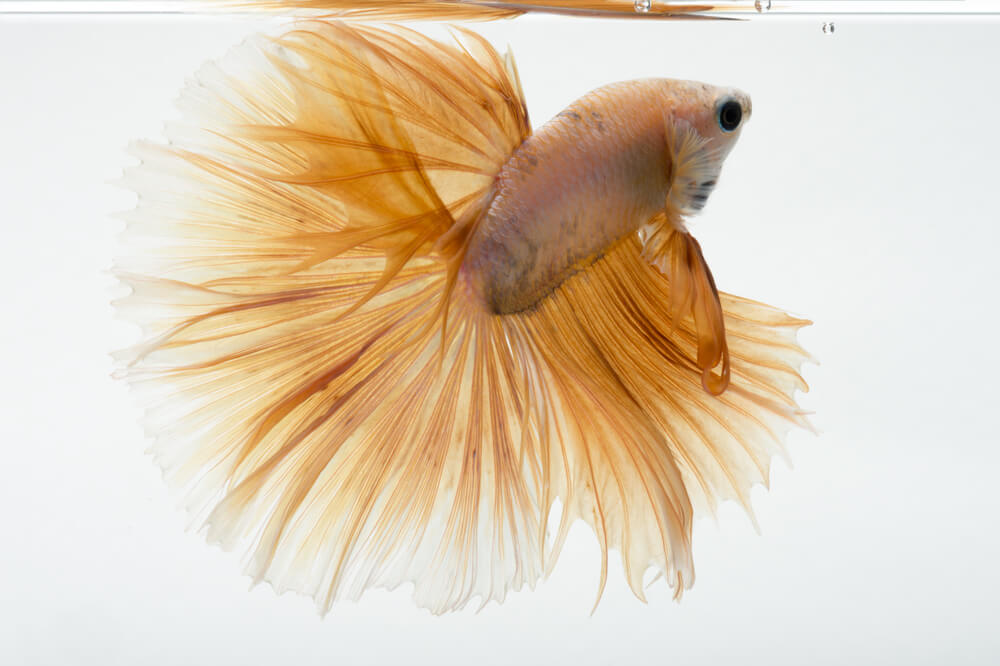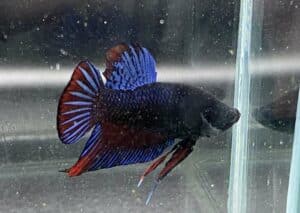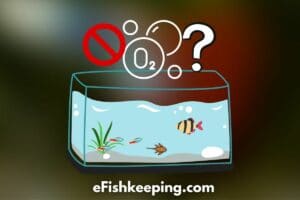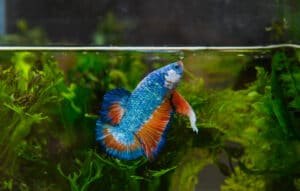Have you ever walked into a pet store and been mesmerized by the stunning colors of the betta fish on display?
These beautiful creatures, also known as Siamese fighting fish, are popular pets due to their vibrant colors and relatively low maintenance requirements.
But have you ever wondered how old these fish are when you see them in the store? Keep reading till the end to learn more.
Here’s How Old Betta Fish Are When You Buy Them At Pet Stores:
Betta fish are typically sold at pet stores when they are around 6-8 months old. That means that these little guys have already been alive for half a year or more before they make it to your home aquarium!
And while they may be small in size, bettas have the potential to live for a decent number of years if they are properly cared for.
Betta fish have a lifespan of 2-5 years, with some individuals living up to 7 years in optimal conditions.
So expect to spend at least 1-4 years or more with your betta fish once you bring them from pet stores.
How To Identify How Old A Betta Fish Is?
| Betta Fish Age: | Relative Size In Centimeter: | Relative Size In Inches: |
| 1 Day Betta Fish | 0.25 cm | 0.1 in |
| 3 Weeks Betta Fish | 0.86 cm | 0.34 in |
| 1 Month Betta Fish | 1.1 cm | 0.45 in |
| 2 Months Betta Fish | 3.3 cm | 1.3 in |
| 7 Months Betta Fish | 7.62 cm | 3 in |
There are a few signs that can help you determine the age of a betta fish:
#1. Size:
One way to determine the age of a betta fish is to check its size. If your fish is on the smaller side, around 2-3 inches in length, it is likely a young fish. Betta fish tend to grow to their full size within a few months to a year, so if your fish is smaller than this, it may not have had as much time to grow.
#2. Color:
Another clue to a betta fish’s age can be found in its coloration. As betta fish age, their colors may start to fade or become less vibrant. If your fish has bright, bold colors, it is likely a younger fish that has not yet reached its full potential.
Related Read: Do Betta Fish Have Black Gills?
#3. Fin Condition:
Betta fish are known for their long, flowing fins, which can be a sign of youth. As betta fish age, their fins may become frayed or damaged, so if your fish has full, healthy fins, it is likely a younger fish.
#4. Behavior:
In general, betta fish tend to become less active as they age. If your fish is swimming around energetically and exploring its surroundings, it is likely a younger fish with plenty of energy and curiosity.
On the other hand, if your fish is more subdued and spends most of its time resting, it may be an older fish.
How Big Do Betta Fish Grow?
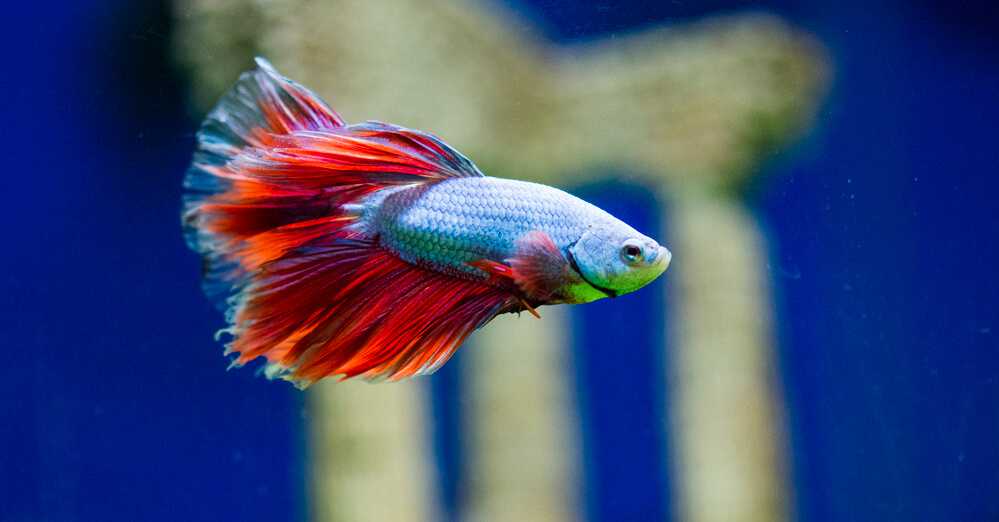
Betta fish are small fish that typically grow to a size of 2-3 inches in length. They generally grow to their full size within the first year of life, although this can vary somewhat depending on factors such as diet and living conditions.
A well-balanced diet is important for the health and growth of betta fish. Providing a diet that is rich in protein and other nutrients can help support healthy growth and development.
Also, Betta fish need a clean and appropriate living environment to thrive. Providing plenty of space to swim and avoiding overcrowding can help promote healthy growth and development.
Are Betta Fish Easy To Keep?
Betta fish are generally easy to care for as long as their basic needs are met. Here are some things to keep in mind while taking care of a betta fish:
#1. Tank Size
When it comes to choosing a home for your betta fish, size matters! While a small bowl may be cute and convenient, it’s not sufficient for your finned friend’s needs.
A spacious tank with a minimum size of 5 gallons is a must. However, it’s always better to err on the side of caution and provide your betta with even more space to swim and explore, so a larger tank of 10 gallons or more is ideal.
#2. Temperature
Temperature is crucial for betta fish. They are tropical creatures and thrive in warm waters, so make sure to keep the temperature in their tank between 72 and 80 degrees Fahrenheit.
A reliable heater will come in handy to ensure that the water temperature is just right for your betta.
#3. Oxygenated Environment
A clean and oxygenated environment is essential for your betta’s health and well-being. A filtration system is a must-have for any betta tank, as it helps to remove toxins and waste from the water, keeping it fresh and clear.
Related Guides: Do Betta Fish Need Air Pumps?
#4. Substrate
Betta fish need a substrate, such as gravel or sand, to rest on and to provide a natural environment.
Not only does it add a touch of aesthetics to your betta’s home, but it also serves as a place for beneficial bacteria to thrive, helping to maintain proper water conditions.
#5. Diet
A varied diet is key to keeping your betta fish happy and healthy. Offer them high-quality pellets as a staple and supplement with frozen or live foods, such as brine shrimp or bloodworms.
Remember to feed your betta small amounts once or twice a day, as overfeeding can lead to health issues.
Related Read: How Much Do Betta Fish Weigh? Can They Get Fat?
#6. Water Quality
Betta fish are sensitive to changes in water quality, so it’s important to perform regular water changes to keep the tank clean and maintain proper water conditions.
Aim to change about 10-15% of the water every week or so, using a water conditioner to remove chlorine and other toxins. This will help keep your betta’s home clean and comfortable.
Recommended Guide: The Best Sponge Filter For Betta Fish
Are Betta Fish Hardy?
Well, Betta fish are generally hardy creatures that can adapt to a wide range of living conditions.
However, like any other aquatic fish species, they are prone to illness and can develop various health issues if they are not properly cared for. Some common issues that can affect bettas include:
#1. Fin Rot:
Fin rot is a common condition that is caused by poor water quality or injury to the fins. It is characterized by frayed or ragged fins and can progress to more serious infections if left untreated.
#2. Swim Bladder Disorder:
Betta fish are prone to swim bladder disorder, which can cause them to float awkwardly or have difficulty swimming. This condition is often caused by overfeeding or constipation, and can be treated with dietary changes and medications.
Related Read: Why Do Fish Swim In Circles?
#3. Internal Parasites:
Betta fish can be infected with internal parasites, which can cause symptoms such as lethargy, loss of appetite, and weight loss. These parasites can be treated with medications and proper care.
#4. Bacterial Infections:
Betta fish can develop bacterial infections, which can cause symptoms such as swelling, redness, and loss of appetite. These infections can be treated with antibiotics and proper care.
So, while betta fish are generally hardy creatures, they are not immune to illness and can develop various health issues if they are not properly cared for.
To keep your betta healthy and happy, it is important to maintain a clean and appropriate living environment, provide a balanced diet, and monitor their behavior and health closely.
Wrapping Up
So the next time you see a betta fish at the pet store, remember that these little guys have been around for a while and they have the potential to bring some color to your life for a couple years to come with proper care.
Just make sure to give them the appropriate conditions to thrive and the maintenance they need to stay healthy and happy.
Read Next: Top 25 Betta Fish Quotes And Caption
References:
- “Betta Growth From Birth.” Nippy Fish, 27 Sept. 2017, nippyfish.net/2017/09/27/betta-growth-from-birth.
- Bryan. “Do Betta Fish Grow? How Big? – Bettafish.org.” Bettafish.org, 29 Mar. 2017, bettafish.org/faq/do-betta-fish-grow.
Hi! I’m Praveen Ghoshal, the founder of eFishkeeping.com. Inspired by my Dad, I got interested in fishkeeping when I was a kid. Since then, I have been involved with this hobby. Currently, I have 3 fish tanks at our home, and I enjoy this hobby with my full family. Read more about me here.

